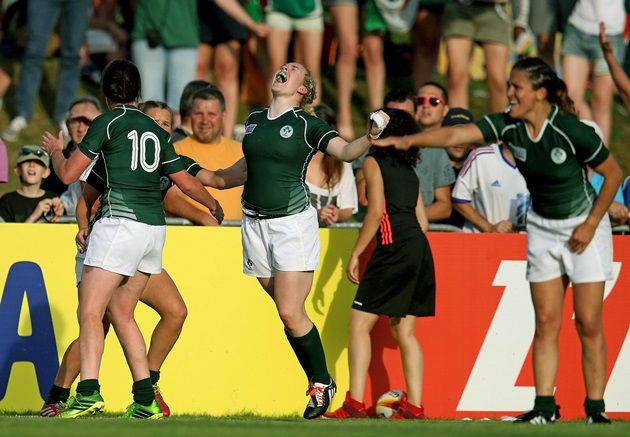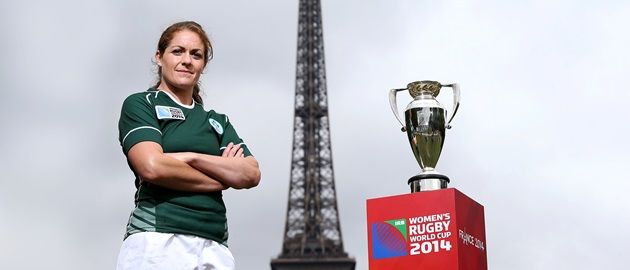

Share
1st January 2015
04:00pm GMT

 They met England in the last four and led 7-0 after an early Alison Miller try but yellow cards hobbled them and they were well beaten. They eventually finished fourth. Having claimed their first ever Six Nations Grand Slam in 2013 and played at Twickenham and the Aviva Stadium in 2014, it seemed like a good time for long-serving captain Fiona Coghlan to call it a day.
"We're going through a rebuilding phase now," Coghlan tells SportsJOE.
"It is the same for nearly every team after a World Cup.
"I could have played on for another year or two but it wouldn't be beneficial for the team going into the 2017 World Cup. I would be taking up a spot (at loose-head prop) when the best course of action is to give someone else a chance to stake a claim."
Along with Coghlan, Lynne Cantwell, Laura Guest, Siobhan Fleming and Grace Davitt have also retired, while team manager Gemma Crowley and coach Philip Doyle have also left. Former mens international Tom Tierney has arrived as the new head coach, and Australian Anthony Eddy has been installed as director of ruby for the women's game, as well as sevens rugby.
Coghlan would like to see the union build upon the recent success enjoyed by the national team. "Where we are now to what is was like when I started in 2003 is incomparable," she says. "Qualifying for the World Cup in 2006 was a huge step forward and drawing with France in 2008 was another.
"Still, it took a long time to get to where we are. We were often flying out late, the night before games, arriving in at 3am and sleeping on people's floors."
They met England in the last four and led 7-0 after an early Alison Miller try but yellow cards hobbled them and they were well beaten. They eventually finished fourth. Having claimed their first ever Six Nations Grand Slam in 2013 and played at Twickenham and the Aviva Stadium in 2014, it seemed like a good time for long-serving captain Fiona Coghlan to call it a day.
"We're going through a rebuilding phase now," Coghlan tells SportsJOE.
"It is the same for nearly every team after a World Cup.
"I could have played on for another year or two but it wouldn't be beneficial for the team going into the 2017 World Cup. I would be taking up a spot (at loose-head prop) when the best course of action is to give someone else a chance to stake a claim."
Along with Coghlan, Lynne Cantwell, Laura Guest, Siobhan Fleming and Grace Davitt have also retired, while team manager Gemma Crowley and coach Philip Doyle have also left. Former mens international Tom Tierney has arrived as the new head coach, and Australian Anthony Eddy has been installed as director of ruby for the women's game, as well as sevens rugby.
Coghlan would like to see the union build upon the recent success enjoyed by the national team. "Where we are now to what is was like when I started in 2003 is incomparable," she says. "Qualifying for the World Cup in 2006 was a huge step forward and drawing with France in 2008 was another.
"Still, it took a long time to get to where we are. We were often flying out late, the night before games, arriving in at 3am and sleeping on people's floors."
 Coghlan adds: "I firmly believe that the talent is in this country to produce a team that can win the World Cup. We need our players competing at a higher level though. The inter-pro matches are not high enough. I hope there can be a competition where we can take on the best in England, France and beyond. We should also look into having a full Under-20s squad as the playing pool is bigger.'
While it was "brill" to play at the Aviva, following the men's Six Nations match with Italy, the former captain is not sure if such grand moves are cost effective.
"Playing at Donnybrook or the RDS may make it more accessible for supporters and provide greater crowds. Ashbourne is an amazing venue and we have always loved playing there but there's no denying that it is a bit out of the way."
Coghlan is back teaching at Lucan Community College but has not ruled out a return to the national set-up in one guise or another.
"I do miss it and I'd say I will even more when the training starts again, in January, for the next Six Nations. One way or another, I will be out in Ashbourne (in February) cheering the girls on."
Coghlan adds: "I firmly believe that the talent is in this country to produce a team that can win the World Cup. We need our players competing at a higher level though. The inter-pro matches are not high enough. I hope there can be a competition where we can take on the best in England, France and beyond. We should also look into having a full Under-20s squad as the playing pool is bigger.'
While it was "brill" to play at the Aviva, following the men's Six Nations match with Italy, the former captain is not sure if such grand moves are cost effective.
"Playing at Donnybrook or the RDS may make it more accessible for supporters and provide greater crowds. Ashbourne is an amazing venue and we have always loved playing there but there's no denying that it is a bit out of the way."
Coghlan is back teaching at Lucan Community College but has not ruled out a return to the national set-up in one guise or another.
"I do miss it and I'd say I will even more when the training starts again, in January, for the next Six Nations. One way or another, I will be out in Ashbourne (in February) cheering the girls on."Explore more on these topics: